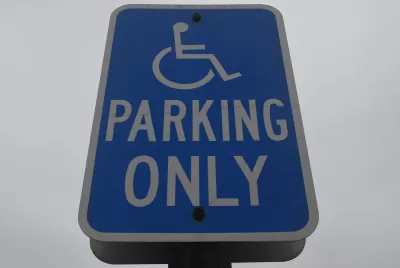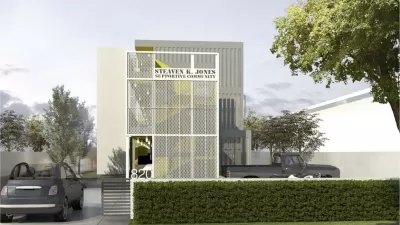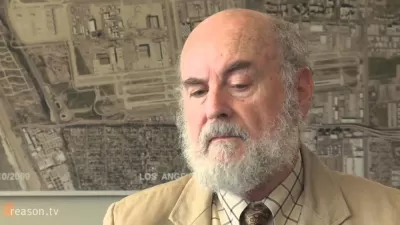The fine for misuse of a placard will increase considerably, but not everyone agrees this is the right way to address a growing problem.

The Los Angeles City Council recently voted to raise the fine for misuse of disabled placards from $250 to $1,100. The placards allow users to park free and for an unlimited amount of time in metered spaces, and abuse is rampant. The practice means that people who need access to disabled parking spaces often cannot find available spots.
But the focus on enforcement and fines is not a universally accepted strategy. Fernando Torres-Gil and Donald Shoup at UCLA say limiting the number of placards handed out would be a more effective tactic, reports Sonja Sharp:
The so-called two-tier system would divide California’s current placard holders — roughly 2.5 million people, or about 6% of the population — into those with severe mobility impairments and those whose disabilities are less physically limiting, shearing the latter class of many of their existing protections.
But many disability rights advocates do not support this approach, arguing that it stems from the perception that disabilities are always obvious and that many people who have placards do not deserve them. "The obsession with fraud creates a 'culture of harassment' for people who may not fit the public image of disability — wheelchair users who also walk, gym-rat amputees and young mothers with multiple sclerosis and infant seats in their cars," notes Sharp.
Supporters of the tiered system say that the majority of individuals considered disabled under the Americans with Disabilities Act do not have severe mobility impairments. As a result, the status of those who do receive placards would be legitimized under the more stringent standards.
FULL STORY: L.A. quadruples the fine for disabled-placard fraud, but will it help?

Maui's Vacation Rental Debate Turns Ugly
Verbal attacks, misinformation campaigns and fistfights plague a high-stakes debate to convert thousands of vacation rentals into long-term housing.

Planetizen Federal Action Tracker
A weekly monitor of how Trump’s orders and actions are impacting planners and planning in America.

San Francisco Suspends Traffic Calming Amidst Record Deaths
Citing “a challenging fiscal landscape,” the city will cease the program on the heels of 42 traffic deaths, including 24 pedestrians.

Defunct Pittsburgh Power Plant to Become Residential Tower
A decommissioned steam heat plant will be redeveloped into almost 100 affordable housing units.

Trump Prompts Restructuring of Transportation Research Board in “Unprecedented Overreach”
The TRB has eliminated more than half of its committees including those focused on climate, equity, and cities.

Amtrak Rolls Out New Orleans to Alabama “Mardi Gras” Train
The new service will operate morning and evening departures between Mobile and New Orleans.
Urban Design for Planners 1: Software Tools
This six-course series explores essential urban design concepts using open source software and equips planners with the tools they need to participate fully in the urban design process.
Planning for Universal Design
Learn the tools for implementing Universal Design in planning regulations.
Heyer Gruel & Associates PA
JM Goldson LLC
Custer County Colorado
City of Camden Redevelopment Agency
City of Astoria
Transportation Research & Education Center (TREC) at Portland State University
Jefferson Parish Government
Camden Redevelopment Agency
City of Claremont





























